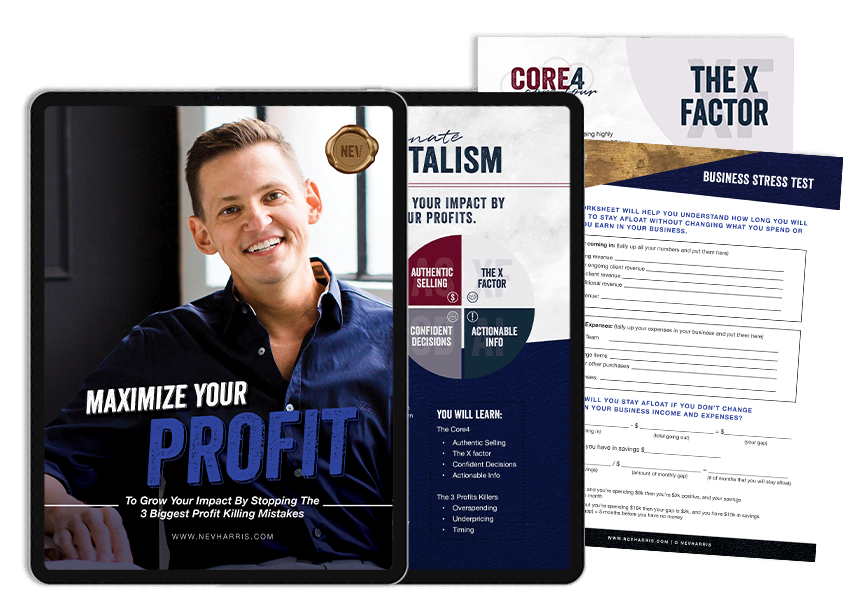Triage Your Expenditures and Save Your Agency’s Life


So, imagine that you have to go to the emergency room because you’ve done something really stupid—I don’t know, maybe you tried to fix the shape your eyebrows with a lit match or some shit that you saw on Instagram. It hurts like hell. You put ointment on it, and you’ve got a bag of ice to your forehead as you drive yourself to the hospital.
Upon arriving and filling out ten pages of checkmarks, a nurse asks to speak to you. You try to explain in the least embarrassing way possible that you really wanted eyebrows like Jeff Goldblum’s, and you tell them that your pain level is about a 7 of 10.
They send you back to the waiting area, where you sit down and wait to be attended.
On your right is a clown that just fell off a unicycle and broke his leg. He’s made himself a temporary cast out of balloon animals, but he’s honking that godawful nose in obvious, excruciating pain.
On your left is an old lady who was having chest discomfort while feeding her 47 cats, but she has no other determinable symptoms. In fact, she’s politely knitting a sweater which looks like it’s made out of literal cat hair. Gross.
So, which one of you will get called back to see the doctor first?
Granny Cats-a-Plenty, of course.
This seems cosmically unfair, but there’s a method to the madness. And the reason that nurses go through so many hours of training is to be able to recognize what needs attention now, and what can wait.
You see, GranGran is experiencing worrying signs of a heart attack, which come in the form of seemingly-innocuous chest pains. If it’s nothing, great. If it’s something, and taking into consideration her advanced age, it could kill her in a matter of hours.
You and Junko the Colorful Nightmare are gonna have to wait.
Now let’s take a look at your agency’s finances with the same scope that the emergency room nurse, often called a triage nurse, used to look at your dumb eyebrows.
Every agency goes through financial ups and downs—this is (like) Vegas, baby. But when your agency is in an emergency situation, each of your expenses needs to be reevaluated for usefulness and necessity. As long as your agency is making some semblance of profits, you are going to have expenditures.
We run into problems when it’s hard to determine just how important the things that drain our bank accounts are. Areas that can seem crucial to our agencies’ turnaround could actually be really insignificant in the short, or even long, term. And on the even scarier side, we could potentially be cutting funds to the essential areas of our operations. This could signal the death knell to our dreams of success.
So now we’re headed back to the emergency room.
We can divide your agency’s expenditures generally into three categories:
- Superficial
- Adjustable
- Vital
They might seem pretty much self-explanatory, but let’s break them down anyway, just for fun. We can see how they work in terms of our three patients.
- Superficial: That’s you, Eyebrow Guy (or Gal).
When you made the genius decision to listen to an Internet influencer instead of common sense, you gave yourself a superficial wound. It’s not going to affect more than the surface-level aspects of your body.
Does it sting with the force of a million bees? Yes. Is everyone going to realize how much of a moron you are? Absolutely. (We’d suggest using your time in the waiting room to come up with a better story to explain your injury.) But will it have a long-lasting effect? Unlikely.
That makes you, for now, the last priority.
In the same way that your forehead is going to look ridiculous for a couple of weeks without having permanent damage, there are superficial costs that your agency is currently shelling out that are not going to lead to long-term suffering if cut.
The elimination of these items may hurt temporarily (like your eyebrows) or look cool (unlike your eyebrows), but in the long run, you’ll be okay.
- Adjustable: That’s the clown with the broken leg.

If you’ve ever broken a bone, you know that it sucks. It hurts. It takes a while to heal. And in the meantime, you’re going to find yourself severely inconvenienced or even debilitated from doing the activities that mean the most to you.
Our “friend” (shudder) Junko is going to be out of the birthday-party circuit for a while. But if he loses that leg, it’s going to be pretty tough to unicycle through children’s nightmares for the foreseeable future.
So the best-case scenario is to have his leg set in place, immobilized, and in the process of healing. And in the meantime, he can (carefully) practice juggling human heads, or whatever it is that clowns do for fun.
Your agency has adjustable costs that it can’t give up entirely, but it can divert or adjust down to a manageable rate for the time being.
In the bigger picture, giving up these assets or features would probably have very dire consequences, but in the short term, we can work with them.
- Vital: That’s everyone’s favorite cat-hair crafter.
Grandma is everyone’s number-one priority at the moment, because they realize the severity of the situation. If the doctor’s and nurses guess wrong or react slowly in her case, they’re going to be mincemeat for the malpractice lawyers. Great for the 47 cats, but not great for the hospital.
Your agency has vital costs, and this is the reason that you’ve been building your emergency fund (HOPEFULLY). If your agency’s floundering and you stop paying these, you’d better just admit that you’re belly-up like a tasty but very-dead fish.
But don’t worry, the cats will take care of you—erm, your clients.
But wait—how do I know which is which?
If you’re not quite sure where your expenditure fits in the triage room, start by asking ourselves some important questions. These will help you figure out if your expenditures are superficial, adjustable, or vital.
Question 1: “What are my top 5 biggest expenditures?”

This is an important question to which you should definitely already have the answer (and if you don’t, talk to us about how you can better organize your finances).
The key here is to be shameless in your answers and your honesty just as in the case of the emergency room.
If you had instead told the triage nurse that you developed some sort of mysteriously infectious lesion around your eyebrows, a lot of unnecessary chaos would have ensued. Even more than that, you would have wasted lots of hospital resources, and you could have put the clown and the knitting nana at greater risk.
So even if your top 5 biggest expenditures include team Starbucks runs or regular groomings for the “team mascot”, your transparency will be what saves the day, or your pride will have the opposite effect.
Question 2: “If I had to cut everything but the bare-bones tomorrow, would I keep this?”
Another important question that can easily pare down your expenditures but only with blatant honesty. Simple. Straightforward. Marie Kondo-style. We’re into it.
Question 3: “Do I need this for a project I am working on RIGHT THIS SECOND?”
There’s a chance that you are paying for some things that you’ve used in the past and have found absolutely crucial to assist in a project. That’s great, because we’re all about getting our money’s worth.
But if you’re not using it right now, it could be possible to suspend a membership on an app, per se, or to reduce your dependency on a service to the point where you are paying less. Remember: Every cent counts.
This is an awesome habit to develop whether you’re in a time of crisis or not, so fight back against laziness and complacency, and try to actively monitor what you’re paying for and when. We’ll touch a little more on that in just a sec.
Question 4: “Who am I spending money on this for?”
This question can lead to very obvious sources of superficial expenditures, but it can also require a little bit of soul-searching. More often than not we spend too much money—both our agency’s, and our own—to uphold an image that we think will be impressive to others.
Whether it’s your mom, your digital agency contemporaries, or the bully from your third grade class, no one is directly benefiting from these displays of vanity. And at times of financial insecurity, they are what comes last. As long as you have the base materials to continue being attractive to potential clients, you’ve got enough.
Think of it this way: What will send a bigger message to Danny McJerkface from the elementary school playground— your triple-thickness letterhead stationery, or your agency coming back from a dip, thanks to your sheer grit and resourcefulness?
So, let’s kickstart your Triage Plan-of-Action.
- Categorize your expenditures…
…down to the last dime! By doing this, you’ll get a raw look at where your money is going, and you’re certain to see areas that can be pruned right away.
- Try to AVOID your emergency fund at all costs.
Before you dip into that sweet, sweet pot of salvation, do Step 1. Then do it again. Then be objective, not emotional. See if you can hold on without relying on your safety net.
Unfortunately, there’s no guaranteed timeline for a comeback, and you don’t want to put yourself into a situation where all you needed was two more months that you don’t have.
- Remember that growth can be a little uncomfortable sometimes.

Nobody said it was easy, and nobody’s blaming you, but the factors that led you to this point dictate what you’re going to be cutting and keeping. You want to ensure your agency’s success, so you’ve got to adapt and overcome, or accept failure.
Every single patient in that emergency room, including yourself, wants to be attended right now. You each demand the nurses’ time and energy. I’m sure that the triage nurse wishes that everyone could be taken care of right away, but it’s impossible. Choices have to be made. There are simply crises that are more important than others.
Triaging your expenditures might not feel spectacular in the short-run, but I can guarantee you that you won’t regret it as you recover and reconquer, now with more funds available and not tied up in wasteful spending.
Above all, remember that every agency experiences tough times—it’s a part of the process, and it’s nothing to be ashamed of. And just like becoming a triage nurse takes time and study, so does becoming a master at triaging your expenditures. Keep pruning, paring and analyzing what you’re spending in order to become a master at eliminating what’s holding you back.
And in the meantime, please leave your eyebrows to the professionals.
For more information on this and other ideas for ways to make your spending count, check out the Profit and Impact Podcast.
And if you liked this post, you might like this TED Talk I saw the other day, with a similar mindset!


